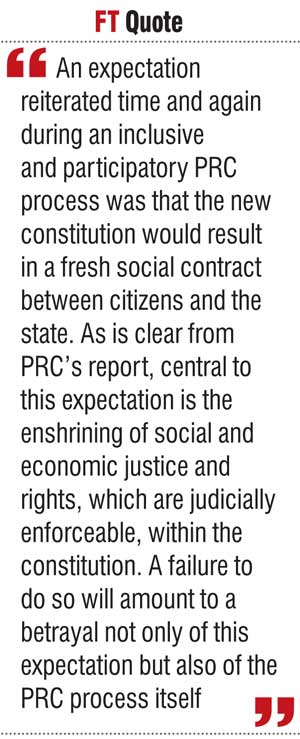Friday Feb 20, 2026
Friday Feb 20, 2026
Saturday, 10 September 2016 00:00 - - {{hitsCtrl.values.hits}}
The Committee of Public Representations on Constitutional Reforms appointed by Prime Minister, Ranil Wickremesinghe to seek public opinion on the proposed constitutional reforms handed over its report to the Speaker of Parliament on 1 June
We, the undersigned organisations and individuals, call on all members of the Constitutional Assembly, and in particular the Steering Committee, to ensure that the new constitution of Sri Lanka is underpinned by a substantive recognition of the obligations of the state to further social and economic justice and rights.
Firstly, we note that this will be in keeping with the large number of submissions made in this regard to the Public Representations Committee on Constitutional Reforms (PRC) from across the country. This is clearly reflected in the PRC’s own extensive recommendations on social and economic justice, especially those contained in the report’s chapters on the ‘Directive Principles of State Policy’, ‘Fundamental Rights’, ‘Public Finance’, and ‘Land, Development and Environment’ respectively. 
Secondly, the new constitution must unequivocally crystallise Sri Lanka’s own post-independence history of public provisioning in areas such as health, education and social welfare. This is central to ensure more effective safeguarding of basic entitlements and rights central to freedom, dignity, well-being and human security. This is also critical in the light of the social, economic and environmental costs of monetary, fiscal and trade policies that are widening inequality and precariousness, sharpening regional imbalances, and weakening social policy; processes that have been aggravated by the war as well as post-war approaches to reconstruction and development.
Thirdly, we stress that the constitution must a) place obligations on the state to ensure distributive justice through inclusive, equitable, regionally balanced and sustainable development and b) provide recourse to citizens to claim and enforce their rights in regard to these obligations. This is in keeping with the letter and spirit of Sri Lanka being not only a democratic but also a socialist republic. Moreover, this is also in keeping with Sri Lanka’s obligations as a state party to the International Covenant on Economic Social and Cultural Rights—under which it must take deliberate and concrete steps towards meeting its obligations—as well as its commitments to goals under the 2030 Agenda for Sustainable Development.
Fourthly, we call on the Constitutional Assembly to ensure that through their recognition in the Bill of Rights or as Fundamental Rights, the constitution enables the judicial enforcement of economic and social rights with respect to: education, health, food, water, adequate housing, social security, a living wage, decent and safe work, freedom from forced evictions, and a safe, clean and healthy environment. A Bill of Rights or a Fundamental Rights chapter that only recognises civil and political freedoms not only undermines the indivisible and interdependent nature of rights and entitlements but also seriously imperils the well-being and security of a large section of the country’s population.
We also underline that there is no evidence suggesting that judicial enforceability of economic and social rights inevitably leads to excessive judicial encroachment on policy or unreasonable constraints on the Executive’s or Legislature’s power to allocate and expend resources. On the contrary, it can and does lead to greater accountability and checks and balances on the objects and outcomes of social and economic policy.
Fifthly, we stress that a constitution that fails to address deprivation, distributive injustice and inequality between and across the peoples of Sri Lanka and its different regions will not secure the foundations of justice or peace but sow the seeds of future conflict. A constitutional order that formalises a polity of contradictions in which political equality sits alongside social and economic inequality will eventually threaten the structure of political democracy itself. The Constitutional Assembly and the Steering Committee are duty-bound to guard against this by ensuring a constitution that guarantees civil, political, economic and social justice for all.
We note, finally, that an expectation reiterated time and again during an inclusive and participatory PRC process was that the new constitution would result in a fresh social contract between citizens and the state. As is clear from PRC’s report, central to this expectation is the enshrining of social and economic justice and rights, which are judicially enforceable, within the constitution. A failure to do so will amount to a betrayal not only of this expectation but also of the PRC process itself.
Indeed, we note with grave concern that the current post-PRC phase of the constitutional reform process has been very non-transparent, whether with respect to the working of the Steering Committee, the six Sub-Committees, and the Panel of Experts or the overall time frame and process. Contrary to articles 4 and 11 of the resolution that converted Parliament into the Constitutional Assembly, no meaningful attempt has been made to institutionalise transparency and disseminate or broadcast such information to the public.
The lack of transparency is almost certain to have adverse consequences for the rights and interests of those on the socio-economic margins of the polity. We therefore call on the Constitutional Assembly and the Steering Committee to also take immediate measures to ensure fullest levels transparency in the process. This includes rendering all submissions, reports and official record of deliberations public and ensuring that sufficient time is set aside for meaningful public scrutiny and discussion of the draft constitution thus produced.
Endorsed as of 5 September by 56 organisations country wide including social movements, trade unions, and organisations working to protect the rights of women, minorities, farmers, fishers, workers, teachers, persons with disabilities, sexual minorities, and the environment. It has also been endorsed by 80 individuals including academics, scholars, lawyers, teachers, social activists, writers, human rights defenders, journalists, and professionals from various backgrounds.
List of organisations and individuals who have endorsed the
statement as on date
Organisations
Individuals